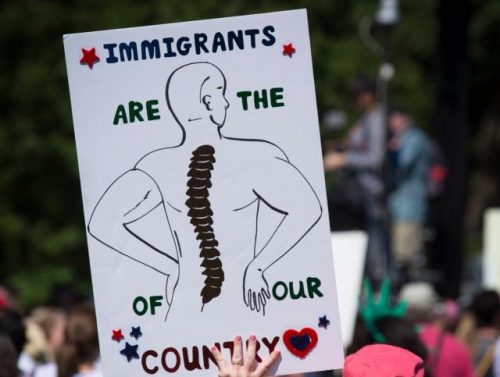WASHINGTON (CNS) — A proposed federal rule change to deny green cards to legal immigrants if they become branded a “public charge” for taking certain federal or state poverty benefits is “a fear-creator,” said William Canny, the executive director of the U.S. bishops’ Office Department of Migration and Refugee Services.
“It makes people afraid to seek housing assistance and food assistance lest they be seen as a ‘public charge’ and then deported,” Canny told Catholic News Service Sept. 28.
The Department of Homeland Security filed its intention Sept. 22 to seek a change in the rule. A 60-day comment period will begin once the proposed rule change is published in the Federal Register.
Such federal programs that would render a legal immigrant “inadmissible” for obtaining a green card that allows the immigrant to work legally in the United States would include the Supplemental Nutrition Assistance Program, Medicaid, Medicare part D prescription subsidies, federal Section 8 housing assistance or living in public housing.
Any legal immigrant found to have used these programs, according to the proposed rule, could be declared a public charge and subject to deportation.

The proposed rule also asked whether participation in the Children’s Health Insurance Program should be included as well.
Federal law on public charges goes back to at least 1882, according to Charles Wheeler, director of training, litigation and support for the Catholic Legal Immigration Network.
“Even before then, states, and colonies, were limiting paupers who were likely to become public charges, Wheeler said during a Sept. 27 webinar on the proposed rule that attracted 1,000 participants. Such restrictions, therefore, he added, were in place “even before the founding of our country.”
In announcing the proposed rule, Homeland Security Secretary Kirstjen Nielsen said Sept. 22: “Those seeking to immigrate to the United States must show they can support themselves financially.” It will “promote immigrant self-sufficiency and protect finite resources by ensuring that they are not likely to become burdens on American taxpayers,” Nielsen said.
“The chilling effect this rule will have will cause a number of immigrant families to forgo public assistance,” said Lucas Swanepoel, vice president of public policy for Catholic Charities USA, in a Sept. 27 phone interview with CNS. “And if they don’t come to public assistance, they come to Catholic Charities.”
The impact could be substantial. The Migration Policy Institute says 10.5 million children live in families receiving public benefits where at least one parent is not a citizen. And of those 10.5 million children, 90 percent are themselves U.S. citizens.
“Many of their (immigrants’) children are born here, they’re American citizens,” said Larry Couch, director of the National Advocacy Center of the Sisters of the Good Shepherd. “This is an attack not only on immigrants but on American citizens,” he told CNS Sept. 25. “I don’t understand this administration. I don’t know why they attack the people who are most vulnerable. I don’t know why they attack families.”
The Trump administration puts the number of families, students, employees and visa holders applying to stay permanently at 382,000.
“If we see a similar uptick in charitable care like we did in the ’90s, the last time this rule was revised, we’re looking at $20 million in charitable care” to be sought from Catholic Charities agencies nationwide, Swanepoel said.
“It is important to understand that this proposed rule is an attack on legal immigration — primarily on families,” said a Sept. 28 statement by Ashley Feasley, MRS’ director of policy.
“We are very concerned that the proposed rule, if it takes effect in the present form, would have far-reaching impacts on family reunification for those family members looking to come from overseas to be with family living here in the United States,” Feasley said. “Also, this is an issue of family welfare, as the proposed rule could lead to parents making the difficult choice of accessing health and nutrition benefits versus adjusting their status or renewing existing green cards.
“This effect has caused people to withdraw from social services,” said Jill Marie Bussey, CLINIC’s director of advocacy, during its Sept. 27 webinar. “This is a tremendously large population that is feeling that fear, feeling that confusion, whether they faithfully can access benefits. Then there is the physical and psychological alarm that results when people are not receiving the benefits that they need.”
Wheeler noted DHS also has identified factors as “negatives” and “positives” — with twice as many negatives than positives. One negative is a large family. “The larger the size, the more difficult it will be for you to support them” in DHS’ eyes, he said.
Legal immigrants have long had sponsors who would vouch for them and support them monetarily on the path to citizenship. But with the proposed rule, according to Wheeler, “they’re turning all that language and all that administrative review around” from the sponsor “to the intending immigrant.” One such change, he said, was assets: whether the immigrants’ income is above 125 percent of federal poverty guidelines for household size. “They’ve never done this before,” Wheeler added.
“The rule changes would dramatically increase the barriers to lawful status for low-income immigrants and their families,” said a Sept. 26 statement by the Leadership Conference of Women Religious, an umbrella group of the leaders of the majority of U.S. women’s religious orders.
“It could dissuade parents from obtaining benefits for which their children qualify, out of fear that they may not be able to regularize their immigration status in the future. Lack of access to public benefits programs will increase poverty, hunger, homelessness and disease, and decrease children’s school attendance and general well-being.”






















